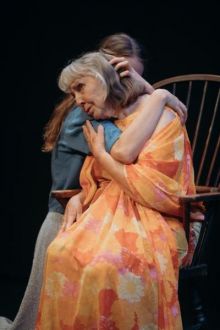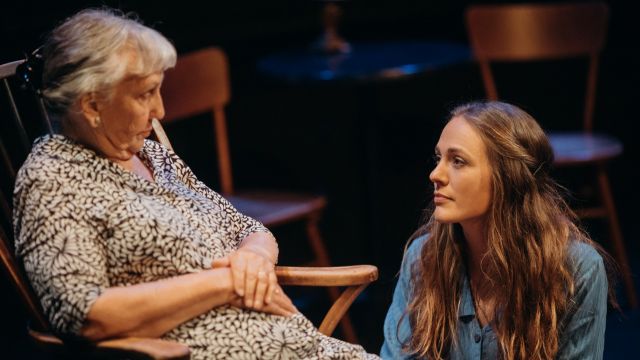Savannah Bay
Savannah Bay is another foray by director Lawrence Strangio into the elusive, ambiguous world of Marguerite Duras – a foray begun in 1994 with his initial production of Duras’ L’amante anglaise, but his on-going productions suggest a life-long affinity with Mme Duras. She wrote the role of ‘Madeleine’ in Savannah Bay – so Mr Strangio tells us in his program note – for the great French actress Madeleine Renaud, then eighty-eight years old. Here, Madeleine is played with poignant but deliberate evasions and enigmatic disappearances by Brenda Palmer. Ms Palmer finally agreed with Mr Strangio that she is now old enough to play ‘old’ ex-actress Madeleine, a woman who struggles to remember and to forget her past. Her struggle is aggravated by a Young Woman (Annie Thorold), maybe her carer, or her granddaughter, who gently but urgently questions Madeleine about Madeleine’s past, in particular about an incident – a drowning - that occurred long ago at Savannah Bay. Even the memory of this incident, despite sharp, specific details, fades and shifts in the remembering.
To make Madeleine a famous, celebrated ex-actress is inspired: not only does her age and muted anguish mean that her memories are unlocated in space or time, but they are permeated by her stage roles with their own intense reality, and the glamour and attention those roles gave her. The drama – such as it is – consists of Madeleine’s unreliable remembering and the Young Woman’s quest to uncover, or to pin down, the past, which may or may not be her ownpast. We see that the Young Woman loves Madeleine, in an almost cloying way, but knows in a matter of fact way that Madeleine is going to die – and then… that will be that.
 Madeleine, for her part, finds the Young Woman’s love – or over-attentive attention - oppressive and intrusive and so resists - and yet cannot help being drawn. Madeleine’s relationship to the Young Woman is ambivalent – of course. Madeleine can seem irritated, and yet lighting designer Claire Springett gives us a lovely moment when the Young Woman leaves the stage for only a moment – and the lights fade, as if the Young Woman’s questions and very presence are keeping Madeleine alive.
Madeleine, for her part, finds the Young Woman’s love – or over-attentive attention - oppressive and intrusive and so resists - and yet cannot help being drawn. Madeleine’s relationship to the Young Woman is ambivalent – of course. Madeleine can seem irritated, and yet lighting designer Claire Springett gives us a lovely moment when the Young Woman leaves the stage for only a moment – and the lights fade, as if the Young Woman’s questions and very presence are keeping Madeleine alive.
We become engaged with Madeleine’s past because it is so important to the Young Woman – and we share the Young Woman’s frustration and Madeleine’s own in her inability to remember, although she may not even have begun were it not for the Young Woman’s urging. But while ‘memory’ may be the subject (a familiar subject in Duras’ work), the incident at Savannah Bay, however, is the ‘action’ of the play. It’s a play about the past and the effort or the impossibility of retrieving it. Yet it’s not ‘past’: it’s there, always, ineffable.
Ms Palmer and Ms Thorold enliven proceedings by letting us see, clearly, the emotions of the two women in the present. The contrast between Ms Thorold’s beauty and the weight of the past borne by Ms Palmer is striking. Mr Strangio inserts suggestive movement: the Young Woman circles her quarry, longing to pounce; Madeleine rises and mimes her glory days when she basked in applause and adoration – a particularly touching sequence.
Performance is more present than reality. But despite the psychological acuity of Duras’ insights, the play is more a web of ideas than drama. The lack of on-stage drama means that the recital of the text becomes almost incantatory in its necessary repetitions and therefore, unfortunately, almost soporific. Is it interesting that Mr Strangio took The Lover - an unreliable memoir – and made a play of it, and that Savannah Bay is already a play, was written as a play, intended as a play, and is there for the Duras devotee something of a trap? The production of this Duras work, in contrast to The Lover, has Mr Strangio and his two actors moving even further from reality and conflict – and therefore drama – and disappearing into the mists of the past.
It’s a tribute to Ms Palmer and Ms Thorold that their acting engages us to follow and even be moved by something so inconclusive, so exploratory, as an old woman’s failing memory and a Young Woman’s need to uncover it.
Michael Brindley
Photographer: Jack Dixon-Gunn
Subscribe to our E-Newsletter, buy our latest print edition or find a Performing Arts book at Book Nook.

